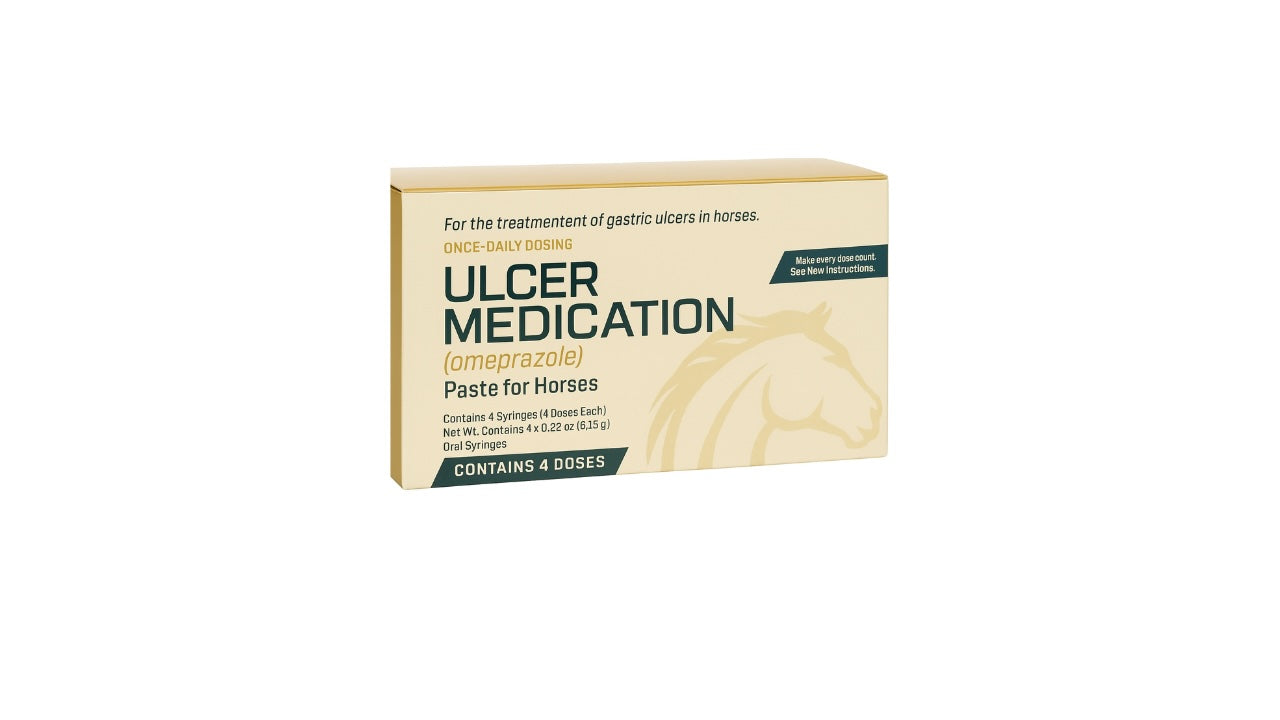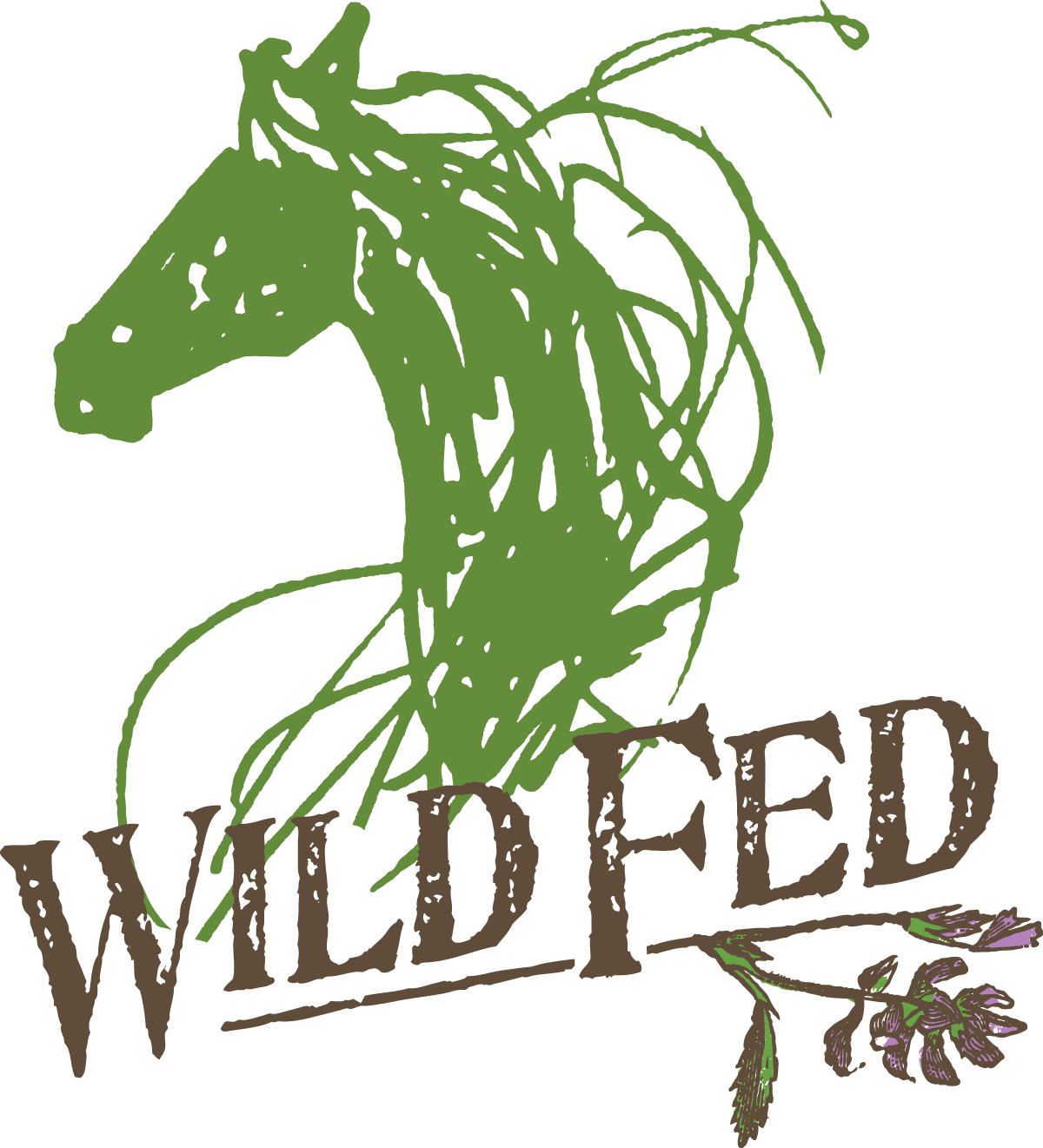
The Hidden Cost of Omeprazole: What Every Horse Owner Should Know
Could Your Horse Have an Ulcer?
Studies show that between fifty and ninety percent of adult horses experience gastric ulcers, and twenty-one to fifty percent of foals are affected as well.That’s nearly every horse who trailers, competes, or experiences stress from feeding schedules or confinement.

Why So Many Horses Develop Ulcers
Horses are designed to graze 16–18 hours a day, producing stomach acid continuously.
When we interrupt that rhythm—through limited turnout, grain meals, trailering, training, or even painkiller use—acid builds up and splashes against unprotected areas of the stomach lining. Stress compounds the problem, tightening the gut wall and lowering blood flow to digestive tissues.

The Trouble with Traditional Treatments
Drugs like omeprazole (GastroGard®/UlcerGard®) suppress stomach acid, creating temporary relief but not true healing. They are not an ideal solution to the problem here is why:
Long-Term Side Effects of Omeprazole in Horses
1. Rebound Hyperacidity (Rebound Hyperchlorhydria)
When omeprazole is discontinued, the body “rebounds” by producing more stomach acid than before treatment.
This is because PPIs block acid secretion; when stopped, the body overcompensates, up-regulating proton pumps and increasing acid output.
Result: New ulcers or re-ulceration are common—especially if the stomach lining hasn’t fully healed.
2. Impaired Digestion & Nutrient Absorption
Stomach acid is essential for breaking down food and activating digestive enzymes. Chronic suppression can cause:
- Incomplete digestion of protein and fiber
- Reduced absorption of minerals like calcium, magnesium, and iron
- B-vitamin deficiencies (especially B12)
Over time, this may lead to poor coat condition, weight loss, dullness, or even skeletal weakness in young or athletic horses.
3. Microbiome Imbalance (Dysbiosis)
Acid acts as a natural barrier to pathogens. Without it, bacteria and fungi can colonize the upper GI tract, leading to:
- Gas, bloating, or diarrhea
- Overgrowth of Clostridium difficile or E. coli
- Reduced beneficial microbes → weaker immunity and gut inflammation
4. Increased Risk of Colic and Hindgut Acidosis
Food that isn’t properly digested in the stomach ferments in the hindgut, leading to gas buildup and acidosis.
Studies have linked long-term omeprazole use to a higher risk of gas colic and hindgut ulceration, which are often more painful and difficult to treat.
5. Altered Calcium & Bone Metabolism
Omeprazole can interfere with calcium absorption and bone remodeling.
In horses on long-term therapy, delayed healing of fractures and reduced bone density have been observed—similar to findings in humans on chronic PPIs.
6. Adrenal & Hormonal Effects
Emerging evidence suggests that chronic acid suppression can affect cortisol metabolism and stress response, potentially weakening adrenal resilience.
This can lead to chronic fatigue, poor recovery after exercise, or behavioral changes.
7. Dependency
Because of rebound acid production, many horses become dependent on omeprazole to remain comfortable.
When stopped abruptly, horses may show severe discomfort, irritability, or anorexia within days.

A Better Way: Heal the Gut, Don’t Silence It
At Wild Fed, we take a holistic approach—one that nourishes, protects, and restores balance from within.
Our STOMACH SOOTHER is crafted from a blend of organic herbs chosen to calm inflammation, coat the stomach, and strengthen the mucosal barrier, allowing the gut to heal naturally and stay healthy.
The herbs in Stomach Soother work synergistically to:
-
Create a soothing, mucilaginous barrier that shields raw tissue from stomach acid
-
Calm inflammation and pain while allowing epithelial cells to regenerate
-
Replenish essential minerals and nutrients needed for tissue repair
-
Balance the gut microbiome, supporting healthy digestion and immunity
-
Ease tension in the gut and nervous system, reducing the stress-acid feedback loop
The result is not just relief—but true healing from the inside out.
Your horse’s digestive lining is strengthened, their mood and appetite improve, and their whole system returns to balance.

How to Feed Stomach Soother
For Active Ulcers:
Feed 2 scoops twice daily (morning and evening) mixed with your horse’s regular feed. Continue for at least 4 weeks, then drop down to 1 scoop twice daily for 4 more weeks. For horses recovering from known ulcers or coming off omeprazole, continue at the full dose for one month, then reduce gradually.
For Prevention:
Use 1 scoop twice daily before or during stressful periods such as:
-
Trailering or travel
-
Competitions or training changes
-
Moving to a new barn or pasture
-
Introduction of new herd members
-
Seasonal transitions or weather extremes
These are the times when a horse’s natural stress hormones rise—often leading to increased acid production.
Feeding Stomach Soother during these windows provides a protective buffer, calming both gut and mind before stress takes hold.
Wild Fed’s Promise
here are plenty of “natural” products out there—but not all are created equal.
✨ Certified Organic Herbs – no pesticides, no GMOs.
🧪 Third-Party Tested – verified free of mold, heavy metals, and contaminants.
💚 Doctor Formulated – created by Dr. Samantha Wellspring, Naturopathic Doctor & Herbalist.
🙏 Crafted with Love & Prayer – each batch is blessed for the highest good of every horse who receives it.
Wild Fed Prayer
“With love and intention, we bless each formula, that it may bring the greatest benefit to every horse who receives it. May their health and vitality be lifted, so they may live their longest and most vibrant life. Thank you, and so it is.”

